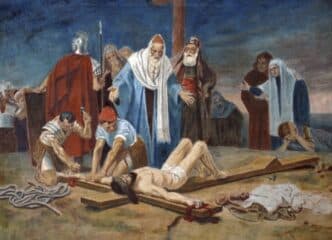I often return to Charles Péguy at Easter. One of my favorite poets, his words remind me what it’s all about.
From his long poem “The Portal of the Mystery of Hope,” these are the lines I recall at every remembrance of Christ’s resurrection: “So God, for each soul that is saved, rings the eternal Easter bells. And he says: I told you so.”
That’s my favorite bit of the whole very long poem — about God saving souls, ringing eternal bells, saying “I told you so.” I can’t entirely describe it, the words just hit me; they seem, at least to me, to say perfectly what God does at Easter. They seem to say it just right: What God does with us.
And hope is the effect. A dead body comes to life, dawn comes as darkness fades, sins are forgiven, sluggish souls are revived; against all obvious odds, God wins the game. Fearing this wicked and violent world, fearing damnation for all the sins you’ve committed, all the prayers you’ve not prayed, it is all too easy to think everything’s lost, to think oneself and everything else are beyond redemption. But it’s not. God will save us. He will ring the eternal Easter bells.
‘I told you so’
He will say to us, as he wipes our tears away, “I told you so.” Why were we ever afraid?
This is how I understand Easter, the sense I make of the exhilarating chaos of the Bible’s various stories about Jesus’ Resurrection. What is found in the Gospels is enough to make your head spin, but I think that’s kind of the point. Repeatedly, the disciples are left wondering in weird joy having seen the risen Lord. There is indeed a holy deliriousness to Easter. This story from John’s Gospel is no exception.
Mary Magdalene is up before dawn to visit Jesus’s tomb. To anoint the body? To mourn? John doesn’t say. Is she even alone; when she runs to Peter and the beloved disciple, she says “we.” But those details don’t really matter. What matters is her fright seeing the tomb open. She doesn’t seem to investigate; she apparently just runs away. She assumes, not implausibly, that the body of Jesus was stolen.
| April 20, 2025 – The Resurrection of the Lord |
|---|
| Acts 10:34a, 37-43 Ps 118:1-2, 16-17, 22-23 Col 3:1-4 OR 1 Cor 5:6b-8 Jn 20:1-9 |
You can almost hear her heart beating through the verses of the story. Filled with love for Jesus, filled also with fear, the world still dark, and she runs to Peter. “They have taken the Lord from the tomb, and we don’t know where they put him” (Jn 20:2). She calls him “Lord,” but still she’s not thinking of resurrection; her faith is still filled with fear.
God wins the game
But, of course, Peter and the beloved disciple (presumably John) do not possess cooler heads. They run to the tomb; Peter — maybe he’s older; maybe there’s some symbolism to it — runs slower. But when Peter enters the tomb first, seeing what he sees, the story doesn’t say what he made of it. Only Luke tells us that Peter went home “amazed” (Lk 24:12).
The beloved disciple “saw and believed,” it says, but that’s complicated in the very next verse where it says, “they did not yet understand the Scripture” (Jn 20:9). So, what exactly did the beloved disciple believe? What’s going on? As I said: holy deliriousness. Mary Magdalene’s racing heart, Peter’s wondering, the beloved disciple’s rushed belief: these are Easter’s first experiences.
But these experiences teach us. For they are like our experiences — or so I can say for myself — especially in the earliest moments of conversion, the first feelings of salvation. God died for me? He rose from the dead for me? God’s forgiving me? What’s going on? The plausible thing is death and the grave and nothing more or, if you’re not an atheist, hell for the wickedness of our sinful ways — not resurrection, not forgiveness, not Pentecost.
But the Gospel says what it says, and the poet writes what he writes. As you read closely this story from John, you’ll notice that the sun is slowly rising, that as Mary and Peter and the beloved disciple are scurrying about, things are slowly getting brighter. Because ours is a God who saves souls. He rings eternal Easter bells and says to us, “I told you so.” Because God loves us anyway. Because God wins the game.








